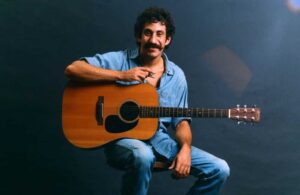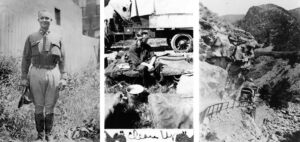It’s been six decades since Gene Watson emerged from his childhood home in Sumner, Texas, with a hobby that would eventually land him a spot as one of Nashville’s most prolific recording artists of the 1970s and ’80s.
Strangely enough, it seems, that hobby wasn’t music.
From an early age, Watson knew the career path he wanted — the auto body repair business. He was so sure, in fact, that he spent more time at the local salvage yard than he did in school … except on the days Miss Opal Horton came to Sumner, that is. Miss Opal taught music to kids across Lamar County, and when it was her day in Sumner, Watson made sure he sat in the front row.
Between singing at church and for Miss Opal, a lot of kids in the county learned about music. In fact, 15 miles south of Sumner, future Oak Ridge Boy Duane Allen was busy learning from Miss Opal at the same time as Watson. Allen went on to get a college degree in music.
On the other hand, by the time Watson turned 16 he was so sure he knew where his path would lead that he dropped out of school altogether. He eventually made his way to Houston, where he took a job in an auto body shop.
However, his love for music didn’t fade. By the early 1960s he was singing in nightclubs around Houston, and he released his first album in 1962, when he was just 19 years old.
Still, it would be another decade before Watson’s path turned in a drastic new direction.
Watson’s early attempts at recording didn’t take him far. But by 1975, with the support of several Nashville stars, including The Wilburn Brothers, he signed a deal with Capital Records. That summer he released his first major label single, “Love in the Hot Afternoon.”
The sultry lyrics about a summer love in New Orleans took Watson to No. 3 on the country charts and launched his new career. Labeled the “Singer’s Singer” because of his voice inflection that jumps octaves with ease, Watson followed that debut hit with plenty more. In fact, in the years since, he has recorded 34 studio albums, charted 72 songs, landed 23 Top 10 hits and placed six singles atop the charts.
Despite his years on the road, Watson’s voice is still as strong as ever. In fact, if you listen to the original recording of “Love in the Hot Afternoon” and then hear him sing the song live, you’d never know so many years have passed. The same holds true with his other early singles like “Paper Rosie,” “Should I Come Home (or Should I Go Crazy)?” and his signature song, “Farewell Party.”
Along the way, Watson’s songs have turned up on television shows like “WKRP in Cincinnati” and in movies like “Convoy.”
In 1982, Gene Watson released the single “Fourteen Carat Mind.” It reached No. 1 on the charts and started a string of hits. “Speak Softly (You’re Talking to My Heart),” “You’re Out Doing What I’m Here Doing Without,” “Sometimes I Get Lonely” and “Drinking My Way Back Home” all helped Watson become one of the most successful artists of the mid-1980s. He largely abandoned an on-stage presence with a guitar in hand and truly became a singer’s singer, backed by the Farewell Party Band.
By 1990, Watson’s popularity began to wane — but only if judged by the record charts. He continued to record prolifically. As recently as 2007, USA Today referred to Watson as “one of the most underrated singers” in the business.
He’s certainly not underrated by longtime fans, however, as he continues to pack the house at casinos, music halls and county fairs across the country. In fact, the organizers of the Lamar County Fair annually invite Watson as its headline singer, often for two shows — and fans flock in to see the hometown boy who made good.
In 2012, Watson gave up on traditional commercial recording companies and started his own label, Fourteen Carat Music. The first release was one of the greatest re-recorded albums you’ll find: “Best of the Best, 25 Greatest Hits.” At nearly 70, Watson went to the studio and recorded his favorites a second time. When listening, you can’t distinguish the original from the remake.
Watson has seen the best and worst of times.
While growing up, he lived in a school bus that his family drove for itinerant farming work. He was poor, but no poorer than anyone else, he recalls.
“My dad was kind of like a gypsy,” he said. “His attitude was, ‘If there is a dollar out there, I’m going to make 50 cents off it.’”
The work ethic Watson learned at age 6 in the cotton fields paid off. By the time he was 12, he landed a job at a salvage yard — a good starting place for anyone planning to work in the automotive repair business.
While some may think Watson gave up his true love of auto repair for music, quite the opposite is true.
“I didn’t go searching for a career in music,” he once said. “Music found me.”
Throughout those early years when the hit songs weren’t coming, Watson’s work in a Houston auto body shop kept the food on the table. A half-century later, music might pay the bills, but Watson hasn’t forgotten where he started. Today, auto body work just happens to be his hobby rather than his cash crop.
After growing up poor, living with the ups and downs of the music business, and surviving a bout with cancer, Watson is still going strong at age 79. He’s about to release a new album, and recently the Grand Ole Opry recognized him on stage following an “as good as the album” rendition of “Farewell Party.”
The standing ovation he received that night is hardly the last a crowd will offer. He maintains an active touring schedule and plays to adoring fans across the country. Gene Watson won’t be throwing his farewell party any time soon.
Until next time, keep that classic country loaded on your playlist and satellite radio.
Since retiring from a career as an outdoor recreation professional from the State of Arkansas, Kris Rutherford has worked as a freelance writer and, with his wife, owns and publishes a small Northeast Texas newspaper, The Roxton Progress. Kris has worked as a ghostwriter and editor and has authored seven books of his own. He became interested in the trucking industry as a child in the 1970s when his family traveled the interstates twice a year between their home in Maine and their native Texas. He has been a classic country music enthusiast since the age of nine when he developed a special interest in trucking songs.














I Connie Ross George sang with Gene Watson when he had a gig in Earlsboro Oklahoma Cotton Fields Back Home got to sing with Him He’s the Greatest Person I Ever Knew. Very Kind Man and A Heck of A Country Singer I have About 30 of his tapes and I think I’ll have them Along Time He’s A Great Singer And A Great Person
Your dedication is a positive thing